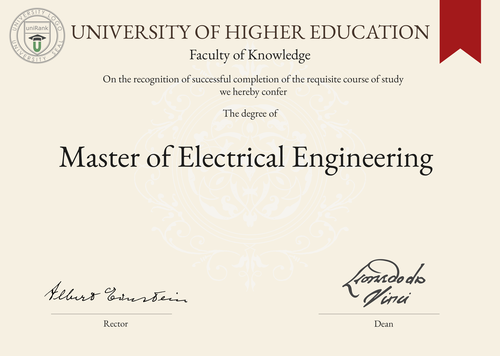
Master of Electrical Engineering (MEE)
Guide to University Programs/Courses
Master of Electrical Engineering (MEE)

Program/Course Name
Master of Electrical Engineering
Program/Course Abbreviation
MEE
Duration Range
1-3 years
Tuition Range (US, UK, AUS, NZ)
$10,000-$50,000 per year
Overview
The Master of Electrical Engineering degree is a postgraduate program that focuses on advanced topics in electrical engineering. This degree is designed to provide students with the knowledge and skills necessary to become experts in the field of electrical engineering. Students will learn about topics such as power systems, control systems, electronics and telecommunications. The program is typically offered by universities and colleges around the world.
Curriculum Overview by Year
- First Year: Students will take courses in advanced mathematics, electrical circuits and electronics. They will also learn about power systems and control systems.
- Second Year: Students will take courses in telecommunications, digital signal processing and computer networks. They will also have the opportunity to take elective courses in areas such as robotics, renewable energy and nanotechnology.
- Third Year: Students will work on a research project or thesis under the supervision of a faculty member. They will also have the opportunity to take additional elective courses.
Key Components
The key components of a Master of Electrical Engineering degree include advanced coursework in electrical engineering, research experience and the opportunity to specialize in a particular area of electrical engineering. Students will also have the opportunity to work on real-world projects and gain hands-on experience in the field.
Career Prospects
Graduates of a Master of Electrical Engineering degree program can pursue a variety of careers in the field of electrical engineering. Some common career paths include working as an electrical engineer, a telecommunications engineer, a control systems engineer, or a power systems engineer. Graduates may also work in research and development or in academia.
Salary Expectations
The salary expectations for graduates of a Master of Electrical Engineering degree program can vary depending on the country and industry in which they work. In general, graduates can expect to earn a competitive salary, with the potential for high earnings as they gain experience and advance in their careers.
For a more accurate understanding of salary expectations, you can utilize the Job Sites Search Engine, from our sister site jobRank, which searches over 4,600 job sites worldwide. Make sure to specify not only the job title but also the country you are interested in.Conclusions
The Master of Electrical Engineering degree is a valuable postgraduate program that provides students with advanced knowledge and skills in the field of electrical engineering. While the duration, tuition fees, curriculum, key components, career prospects and salary expectations can vary by country and university, this degree is widely available around the world. Visitors can search for where this specific degree is offered anywhere in the world through the uniRank World Universities Search Engine.
World Universities Search Engine
search for Master of Electrical Engineering (MEE) and add the Location (country, state etc.) or specific University you are interested in studying at.
Query examples:
- Master of Electrical Engineering (MEE) United States
- Master of Electrical Engineering (MEE) United Kingdom online
- Master of Electrical Engineering (MEE) Australia international students
- Master of Electrical Engineering (MEE) University of California
- Master of Electrical Engineering (MEE) University of London tuition fees
- Master of Electrical Engineering (MEE) University of Sydney scholarships